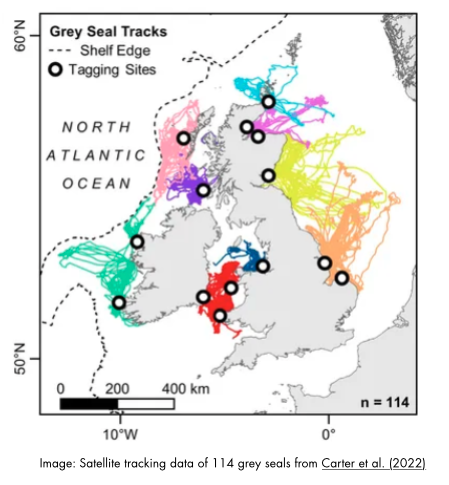The North Sea is one of the most industrialised marine environments on the planet, with thousands of MMS including oil and gas platforms, pipelines, subsea cable routes, and marine renewable energy installations. However, the impact of MMS on ecosystems is unclear. To ensure effective decision-making about removal and installation of such structures in the future, there is an urgent need to better understand the impact of MMS on the North Sea ecosystem.
The EcoSTAR project aimed to uncover the impacts of MMS on marine ecosystems and services, by mapping existing windfarms and oil and gas infrastructure, and measuring the impacts of MMS from the bottom of the food chain (the benthic community) all the way to the top (marine mammals, humans).
EcoSTAR focused on four key research areas:
Video: Foraging seals hunt around wind farms
Existing databases on offshore structures in the North Sea were found to be incomplete and sometimes inaccurate. To address this, researchers created a new, more reliable dataset by combining data from multiple sources (see Martins et al. 2023). As of mid-2024, the North Sea hosts around 600 oil and gas platforms and over 5,000 wind turbines – emphasising the need to plan carefully for their future removal. To be able to robustly predict the potential future impacts of structures, researchers developed a feasible distribution (see Waldman et al. PrePrint) for future windfarms to enable countries to reach their marine renewable energy targets.
Recent research, building on Stadler et al. (2022), found that porpoise behaviour did not appear to be mediated by MMS presence, though it should be noted that the only available tracking data for porpoises in the North Sea are of low resolution and biased towards areas of few MMS. Seal activity varied by region and environmental covariates (Carter et al. [in review], Landscape Ecology) but some individuals did show changes near these structures or repeated visits (see video below). These insights help us understand how top predators might respond to man-made environments. For species that live on the seabed, those living closer to oil and gas platforms expressed fewer traits (traits are the measurable biological features of organisms, including aspects of their morphology, physiology, behaviour, and phenology), suggesting higher functional vulnerability and therefore changes in how the ecosystem works (see Lynam et al. 2025).

Diet assessments through stomach and faecal sample analysis, allows us to understand what the animals ate and helps us to determine local fish availability in time and space. EcoSTAR estimated North Sea harbour porpoise distribution through time using data from a cetacean surveys (SCANS). Seal distribution in UK and Irish waters was estimated using tracking data, habitat models, and haul-out counts (see Carter et al. 2022). These models have been extended to the Northwest European Shelf to allow the transboundary impact of anthropogenic activities to estimated (Carter et al. [in review] Journal of Applied Ecology). Meanwhile Such distributions can help to predict how changes in offshore structures (MMS) might affect the abundance of predators and prey.
A detailed North Sea ecosystem model, Ecopath with Ecosim, was updated to better represent marine mammals and expanded to include more areas. Using input from experts and stakeholders, researchers developed future scenarios — including climate change, and fisheries management — to explore how these changes might affect marine life and fisheries.